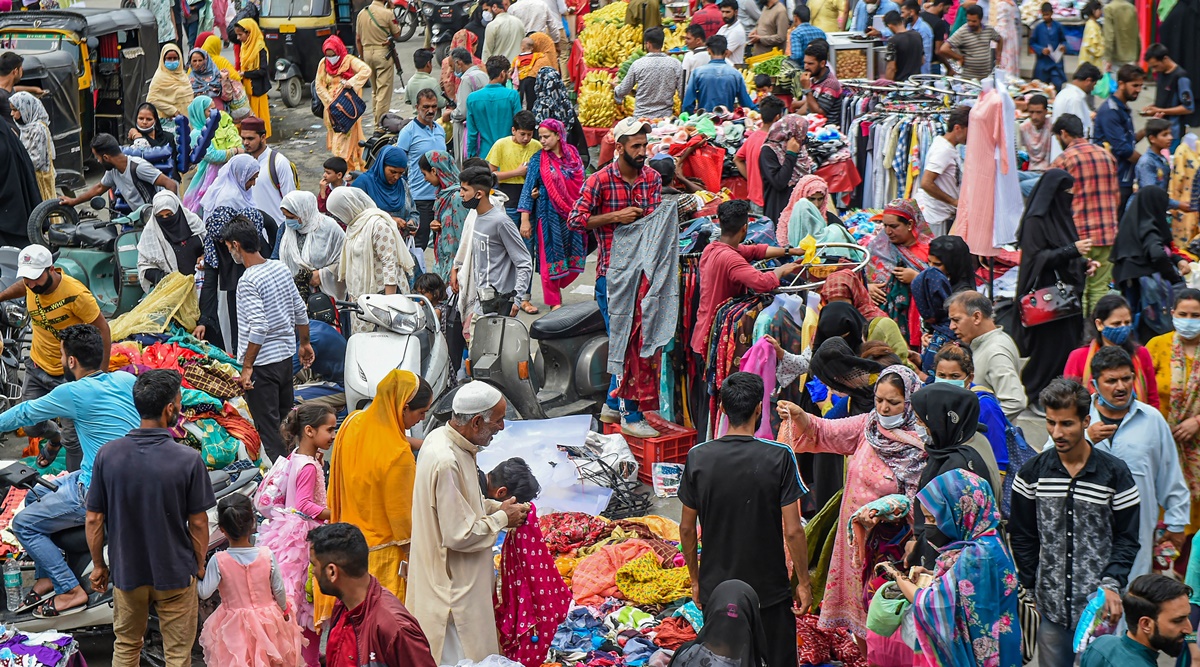 People shop at a market on the eve of Eid-ul-Zuha amidst COVID-19 restrictions, in Srinagar, Monday, July 19, 2021. (PTI Photo/S. Irfan)
People shop at a market on the eve of Eid-ul-Zuha amidst COVID-19 restrictions, in Srinagar, Monday, July 19, 2021. (PTI Photo/S. Irfan) Up to two-thirds of the Indian population above the age of six have already been infected with the coronavirus, the latest nationwide serological survey conducted by the Indian Council of Medical Research (ICMR) has found. That still leaves about 40 crore people who are susceptible to the virus.
The serosurvey, the fourth such exercise, was conducted in June and July, after the second wave had began to subside. A total of 28,975 people were tested for the presence of antibodies specific to SARS-CoV2 virus, and 67.6% were found to have them. For the first time, minors in the age group of 6 to 17 years were also included in the serosurvey, with antibodies interestingly discovered in nearly half of them.
The results of the latest serosurvey mark a huge jump in the prevalence of infection among the population from the previous such exercises, carried out in the same districts. In the third serosurvey, carried out in December 2020-January this year, less than 25% of the surveyed population was found to have the antibodies. In the first survey, carried out between May and June last year, only about 0.7% people were found with antibodies. A subsequent exercise in August and September had found antibodies in 7.1% people.
The fact that two-thirds of the population has already been infected — with the sero-prevalence found to be the same in rural and urban areas — reduces the possibility of a fresh round of infections as severe as the second wave was. More so, because at least 32 crore people have received at least one dose of the vaccine. There would be a considerable overlap between those who have been infected, and those who have got the vaccine, but the two figures together mean that over 70% of the population over the age of six can be expected to have developed some sort of immunity against the disease.
Indicates a milder 3rd wave
The findings of the fourth sero-survey, are significant. Apart from dissipating some worries regarding the ferocity of a third wave, it will also help the government go ahead with its gradual opening up.
Unless the virus mutates in a manner that enables it to escape this immunity, and begins to re-infect people in a big way, the chances of a repeat of a second wave are slim.
But that does not rule out small, localised surges in districts or states. Even at the national level, a vulnerable population of 40 crore leaves a fair possibility for surges like the first wave, or smaller. As ICMR Director General Dr Balram Bhargava also warned, the epidemic was far from over.
“Two-thirds of the general population that is above the age of six years had SARS-CoV-2 infection. More importantly, a third of the population did not have any antibodies… 40 crore population of this country is still vulnerable,” Bhargava said, addressing a press conference.
“The implications of this large serosurvey clearly show that there is a ray of hope. But there is no room for complacency. We must maintain Covid-appropriate behaviour,” he said.
Asked if the government was going to plan opening of schools in a staggered way, as is being suggested by many experts, Bhargava said primary schools can be opened first, then secondary schools. “The antibody exposure in children is very similar to adults,” he noted.
Among minors, the sero-prevalence was 57.2% in the age group 6-9 years and 61.6% among 10-17-year-olds.
As per vaccination status, the sero-prevalence was 62.3% among those who had taken Covid shots, 81% in people who had taken one dose and 89.8% in people who had taken both.
The survey also found sero-prevalence higher among women (69.2% of total) than men (65.8%). Among the different age groups, it was the highest, 77.6%, in the 45-60 age group.
As for health-workers, 7,252 were surveyed and 85% of them were found to have antibodies against Covid-19, with Bhargava stressing the need to ensure full vaccination for all of them “as soon as possible”.
The different sero rates indicate the possibility of future waves of infection, he said. “There may be some states which are very low and the population which is vulnerable is much higher there. Therefore the chances of future waves are higher in those states.”
Bhargava categorically said that social, public, religious and political congregations should be avoided. He also advised against non-essential travel, as well as travel only if one is fully vaccinated, saying these were the messages from the survey.
On school reopening, Bhargava said, “We know clearly that children can handle viral infections much better than adults. Young children… have lower number of ace receptors, to which the virus attaches.”
He gave the example of Scandinavian countries and several parts of Europe which did not shut down primary schools, over successive waves. “So, once India starts considering and the districts start considering, it will be wise to open the primary schools first, and that should be done before the secondary schools… Also, we have to ensure that all the support staff, the school bus driver or teachers, are vaccinated,” Bhargava said.
- The Indian Express website has been rated GREEN for its credibility and trustworthiness by Newsguard, a global service that rates news sources for their journalistic standards.

